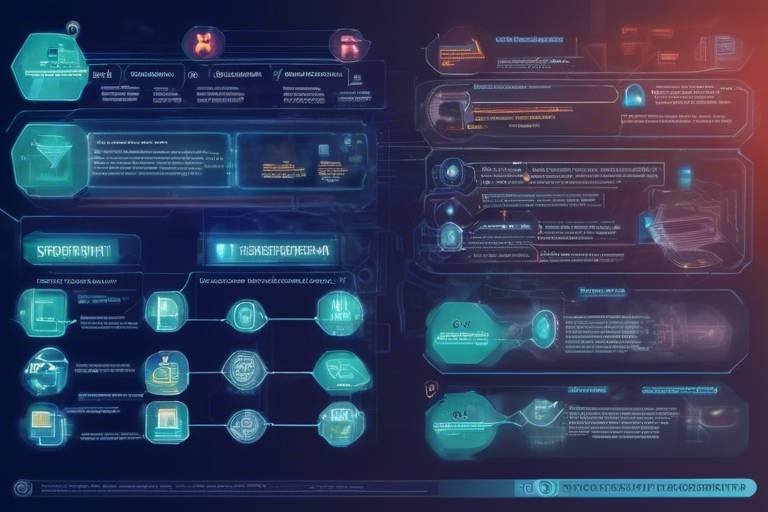Why Cybersecurity is Important for Small Businesses
In today's digital age, cybersecurity has become a buzzword that resonates deeply with businesses of all sizes, but it is especially crucial for small businesses. Why? Because small businesses often lack the resources and expertise to defend against the ever-evolving landscape of cyber threats. Imagine your business as a small castle in a vast kingdom; while larger fortresses might withstand a siege, a small castle can easily be overwhelmed if not properly fortified. The reality is that cybercriminals see small businesses as low-hanging fruit, making them prime targets for attacks such as phishing, ransomware, and data breaches.
The consequences of a cyber attack can be devastating. Not only can it lead to significant financial losses, but it can also result in irreversible damage to your business's reputation. Customers trust businesses with their personal information, and a breach can shatter that trust in an instant. In fact, studies show that 60% of small businesses that suffer a cyber attack go out of business within six months. This statistic alone should be a wake-up call for every small business owner.
Moreover, the importance of cybersecurity extends beyond just protecting data; it also involves ensuring compliance with various regulations. For instance, many small businesses are required to adhere to laws such as the General Data Protection Regulation (GDPR) and the California Consumer Privacy Act (CCPA). Non-compliance can lead to hefty fines and legal repercussions, further emphasizing the need for robust cybersecurity measures.
So, what can small businesses do to bolster their cybersecurity? The first step is to understand the risks they face. This means not only recognizing common threats but also assessing their own vulnerabilities. Implementing basic security protocols, such as using strong passwords and keeping software updated, can go a long way in fortifying defenses. Additionally, investing in employee training is crucial, as human error is often the weakest link in the security chain.
In conclusion, cybersecurity is not just an IT issue; it’s a fundamental aspect of running a successful business today. By taking proactive steps to enhance security measures, small businesses can protect themselves from potential threats, maintain customer trust, and ultimately ensure their longevity in a competitive marketplace. Remember, in the world of cybersecurity, it’s better to be safe than sorry.

The Growing Threat Landscape
In today's digital age, small businesses are facing a growing threat landscape that is more complex and dangerous than ever before. Cybercriminals are constantly evolving their tactics, making it essential for business owners to stay vigilant and informed about the various types of threats they may encounter. From phishing attacks to ransomware, the risks are not just theoretical; they can lead to devastating financial losses and irreparable damage to a business's reputation.
One of the most significant challenges small businesses face is the misconception that they are too small to be targeted. This is far from the truth. In fact, small businesses are often seen as easy prey because they typically lack the robust cybersecurity measures that larger organizations have in place. Cybercriminals know that many small businesses may not have the resources to recover from a cyber incident, making them attractive targets.
To give you a clearer picture of the types of threats small businesses are up against, consider the following:
- Phishing Attacks: These are deceptive attempts to obtain sensitive information by masquerading as a trustworthy entity. They often come in the form of emails that appear legitimate but contain malicious links or attachments.
- Ransomware: This type of malware encrypts a business's data and demands payment for the decryption key. The impact can be catastrophic, leading to prolonged downtime and significant financial loss.
- Data Breaches: Unauthorized access to sensitive information can result in data breaches, exposing customer data and leading to legal ramifications and loss of trust.
Understanding the evolving threat landscape is not just about recognizing these risks; it’s about developing effective cybersecurity strategies tailored to your business's unique needs. This requires a proactive approach to identifying vulnerabilities and implementing security measures that can help mitigate risks.
Moreover, the financial implications of a cyber incident can be staggering. According to a recent study, the average cost of a data breach for a small business can reach up to $200,000, a sum that many small businesses cannot afford to lose. In addition to direct financial losses, there are also costs associated with recovery efforts, legal fees, and potential fines for non-compliance with data protection regulations.
As the threat landscape continues to expand, small businesses must prioritize cybersecurity as a fundamental aspect of their operations. This means not only investing in the right tools and technologies but also fostering a culture of security awareness among employees. After all, your staff can be your first line of defense against cyber threats. By staying informed and prepared, small businesses can navigate this challenging environment and protect their assets effectively.

Common Cybersecurity Vulnerabilities
In the digital age, small businesses are often seen as easy targets for cybercriminals. Why? Because they frequently lack the robust security measures that larger organizations implement. Understanding the that small businesses face is crucial in developing effective strategies to mitigate risks and safeguard sensitive information. Let's dive into some of the most prevalent vulnerabilities that can leave small businesses exposed.
One of the most significant vulnerabilities is outdated software. Many small businesses operate on legacy systems or fail to update their software regularly, leaving them susceptible to known exploits. Cybercriminals are always on the lookout for these weaknesses, as outdated software often contains unpatched security holes that can be easily exploited. Regularly updating software not only enhances functionality but also fortifies defenses against potential attacks.
Another common issue is the use of weak passwords. It's astonishing how many businesses still rely on simple, easily guessable passwords. A weak password is like leaving the front door of your business wide open. Implementing strong password policies, including the use of complex passwords and multi-factor authentication, can significantly enhance security. Furthermore, encouraging employees to change their passwords regularly can help mitigate risks.
Additionally, many small businesses overlook the importance of employee training. Employees are often the first line of defense against cyber threats, yet they may not be adequately trained to recognize phishing attempts or other malicious activities. For instance, an employee might receive an email that looks legitimate but is a phishing attempt designed to steal sensitive information. Regular training sessions can empower employees to identify and report suspicious activities, creating a more secure work environment.
Furthermore, the lack of a comprehensive security policy can leave small businesses vulnerable. Without clear guidelines and protocols, employees may not know how to respond in the event of a cyber incident. Establishing a well-defined security policy that outlines procedures for data handling, incident response, and reporting can help create a culture of cybersecurity awareness within the organization.
Lastly, the absence of data backup solutions can be catastrophic. Imagine losing all your business data due to a ransomware attack or hardware failure. Regularly backing up data ensures that you can restore your systems quickly without losing critical information. Using both on-site and cloud-based backup solutions provides an added layer of security, ensuring business continuity even in the face of cyber threats.
In conclusion, recognizing and addressing these common cybersecurity vulnerabilities is vital for small businesses. By taking proactive steps to update software, enforce strong password policies, train employees, establish security protocols, and implement data backup solutions, small businesses can significantly enhance their cybersecurity posture and protect themselves from evolving threats.
- What are the most common cyber threats faced by small businesses? Small businesses often face threats such as phishing attacks, ransomware, and data breaches.
- How can employee training help in cybersecurity? Employee training raises awareness about potential threats and equips staff with the knowledge to recognize and respond to cyber incidents.
- What should be included in a cybersecurity policy? A cybersecurity policy should include guidelines for data protection, incident response procedures, and employee responsibilities.
- How often should software be updated? Software should be updated regularly, ideally as soon as updates are available, to ensure protection against known vulnerabilities.
- What is the importance of data backup? Data backup is crucial for recovery in case of data loss due to cyber incidents or hardware failures, ensuring business continuity.

The Role of Employee Training
When it comes to cybersecurity, your employees are often the first line of defense. Think of them as the guards at the gates of your business. If they are well-trained and aware of potential threats, they can effectively thwart cyber attacks before they even have a chance to breach your defenses. However, if they lack the necessary knowledge and skills, it’s like leaving the gates wide open for intruders. That’s why employee training is not just a good idea; it’s a critical necessity.
Regular training sessions can help employees recognize the signs of phishing attempts, malware, and other cyber threats. For instance, a well-informed employee can spot a suspicious email that looks legitimate at first glance but contains malicious links. In fact, studies show that organizations with comprehensive security awareness programs can reduce the risk of a successful phishing attack by up to 70%. This is a significant number, especially when you consider the potential damage a successful attack can cause.
Moreover, training doesn’t have to be a boring lecture or a lengthy presentation. Engaging training methods, such as interactive workshops, online courses, and simulated phishing attacks, can make learning about cybersecurity more enjoyable and effective. By actively involving employees in their learning process, businesses can foster a culture of security awareness. This culture encourages employees to take cybersecurity seriously and empowers them to act responsibly when handling sensitive information.
In addition to initial training, ongoing education is equally important. Cyber threats are constantly evolving, and so should your employees' knowledge. Establishing a schedule for regular refresher courses can ensure that your team stays updated on the latest threats and best practices. For example, consider setting up quarterly training sessions that cover new cyber threats, emerging technologies, and updated security protocols.
To illustrate the impact of effective employee training, let’s look at a hypothetical scenario: Company A implements a robust training program that includes phishing simulations and security awareness workshops. Over the course of a year, they notice a significant drop in successful phishing attempts and data breaches. In contrast, Company B neglects employee training and experiences multiple cyber incidents, leading to financial losses and damage to their reputation. The difference? A proactive approach to employee training can save both money and trust in the long run.
In conclusion, investing in employee training is not merely a checkbox on your cybersecurity checklist; it's a vital component of a comprehensive security strategy. By empowering your employees with knowledge and skills, you are not just protecting your business; you are fostering a culture of security that can lead to long-term success. Remember, in the world of cybersecurity, an informed employee is your best defense.
- How often should employee training be conducted? It's recommended to have initial training followed by regular refresher courses at least quarterly to keep employees updated on current threats.
- What topics should be covered in employee training? Training should cover phishing awareness, safe internet practices, password management, and incident reporting procedures.
- Can training be done online? Yes, many organizations offer online courses and webinars that make training accessible and convenient for employees.
- What are the signs of a phishing email? Look for poor spelling and grammar, urgent requests for personal information, and unfamiliar sender addresses.

Implementing Security Protocols
In today’s digital age, is not just a recommendation; it’s a necessity for small businesses. Think of these protocols as the guardrails on a winding mountain road. They keep you on track and protect you from potential dangers. Without them, you could easily veer off course into the abyss of cyber threats. So, how do we establish these crucial protocols? Let’s dive in!
First and foremost, it’s vital to develop a clear set of guidelines that all employees must follow. This includes everything from how to create strong passwords to recognizing suspicious emails. For instance, you might want to enforce a policy that requires passwords to be at least 12 characters long and include a mix of uppercase letters, lowercase letters, numbers, and symbols. This simple measure can drastically reduce the risk of unauthorized access.
Furthermore, consider implementing a two-factor authentication (2FA) system. 2FA adds an extra layer of security by requiring not just a password but also a second piece of information, such as a code sent to a mobile device. This means that even if a password is compromised, your sensitive data remains protected. It’s like having a double lock on your front door—one lock alone may not be enough, but two? That’s a solid defense!
Another essential aspect of security protocols is regular security audits. These audits help identify vulnerabilities in your systems and processes. By conducting these assessments at least annually, you can stay ahead of potential threats and make necessary adjustments. It’s akin to taking your car in for a tune-up; you wouldn’t wait until it breaks down to check the engine, right?
To further reinforce a culture of cybersecurity within your organization, employee training should be an ongoing effort. Create a schedule for regular training sessions that cover new threats and best practices. You can even simulate phishing attacks to see how well your team can identify them. This proactive approach not only educates your staff but also empowers them to take an active role in protecting the company.
Lastly, it’s crucial to have a clear incident response plan in place. This plan should outline the steps to take in the event of a cyber incident, ensuring that everyone knows their role in mitigating damage. Think of it as a fire drill; when a real fire occurs, you don’t want to be figuring out what to do on the spot. Instead, everyone should be familiar with the plan, allowing for a swift and organized response.
In summary, implementing robust security protocols is essential for safeguarding your small business against cyber threats. By establishing clear guidelines, utilizing two-factor authentication, conducting regular audits, providing ongoing employee training, and having a solid incident response plan, you can create a secure environment that fosters trust and protects your valuable data.
- What are security protocols? Security protocols are a set of rules and guidelines designed to protect sensitive information and systems from unauthorized access and cyber threats.
- Why is employee training important? Employee training is crucial because it helps staff recognize potential threats and understand their role in maintaining cybersecurity.
- How often should security audits be conducted? It’s advisable to conduct security audits at least once a year to identify vulnerabilities and ensure that security measures are up to date.
- What is two-factor authentication? Two-factor authentication is a security process that requires two separate forms of identification to access an account, adding an extra layer of protection.

Regular Software Updates
In the ever-evolving world of technology, are not just a good practice; they are absolutely essential. Think of your software as a fortress protecting your valuable data. Over time, vulnerabilities can appear in the walls of that fortress, making it susceptible to attacks. Cybercriminals are constantly scanning for these weak spots, and if your software isn't updated, you could be leaving the door wide open for them.
Many small businesses underestimate the importance of keeping their software up to date. They might think, “Why bother with updates? Everything seems to be working fine.” But this mindset can be dangerous. Just like a car needs regular maintenance to run smoothly, your software requires updates to defend against new threats. These updates often include security patches that fix known vulnerabilities, making it much harder for hackers to exploit them.
Moreover, software updates can also enhance functionality and performance. They often come with new features that can improve your team’s efficiency and productivity. For instance, an updated version of your project management tool might include enhanced collaboration features or integrations that streamline workflows. So, not only are you protecting your data, but you’re also enabling your team to work smarter.
To ensure that your software is consistently updated, consider implementing a structured update schedule. This could be as simple as setting a reminder to check for updates weekly or monthly. Additionally, many software providers offer automatic updates, which can save you time and ensure that you’re always running the latest version. However, it’s crucial to monitor these updates, as sometimes they may require a restart or could introduce new bugs that need to be addressed.
In summary, neglecting software updates is akin to ignoring a leaky roof; it might seem fine for now, but the damage will accumulate over time. By prioritizing regular updates, you not only fortify your defenses against cyber threats but also enhance your business's operational efficiency. So, take the initiative today—schedule those updates and protect your business from potential disasters!
- How often should I update my software? It is recommended to check for updates at least once a week. Many software providers also offer automatic updates, which can simplify this process.
- What happens if I don’t update my software? Failing to update your software can leave your system vulnerable to cyberattacks, as known vulnerabilities may be exploited by hackers.
- Can updates affect my current software performance? While most updates aim to improve performance, occasionally an update may introduce new bugs. It's essential to monitor your systems after updates to address any issues promptly.

Data Protection Strategies
In today's digital landscape, where data breaches and cyber threats are alarmingly prevalent, implementing robust is not just an option but a necessity for small businesses. The essence of these strategies lies in their ability to safeguard sensitive information, ensuring that both the business and its customers can operate in a secure environment. Imagine your data as a treasure chest; without the right locks and security measures, it could easily be raided by cybercriminals. Thus, protecting this treasure is paramount.
One of the most effective methods of ensuring data security is through encryption. Encryption transforms your data into a code that can only be deciphered by those who possess the correct key. This means that even if hackers manage to access your data, they will find it utterly useless without the decryption key. Furthermore, employing secure backup solutions is equally crucial. Regularly backing up data not only protects against ransomware attacks, where data is held hostage, but also ensures that you can restore your systems swiftly in the event of a breach. Think of backups as your safety net; they provide peace of mind knowing that even if something goes wrong, you have a way to bounce back.
Moreover, small businesses should consider the implementation of multi-factor authentication (MFA). This adds an extra layer of security by requiring users to provide two or more verification factors to gain access to sensitive information. It’s like having a double lock on your door; just having a key isn’t enough—you need to provide an additional form of identification. This significantly reduces the likelihood of unauthorized access, making it a vital component of any data protection strategy.
Additionally, organizations should foster a culture of data security awareness among employees. Conducting regular training sessions can empower staff to recognize potential threats and understand the importance of safeguarding data. After all, your employees are your first line of defense. If they are well-informed about best practices—such as recognizing phishing emails or handling sensitive data securely—they can help mitigate risks effectively.
To further illustrate the importance of these strategies, let’s take a look at a simple comparison of data protection methods:
| Data Protection Method | Description | Benefits |
|---|---|---|
| Encryption | Transforms data into a coded format | Prevents unauthorized access even if data is stolen |
| Secure Backups | Regularly saves copies of data | Ensures data recovery in case of loss or breach |
| Multi-Factor Authentication | Requires multiple forms of verification | Enhances security by making unauthorized access more difficult |
| Employee Training | Educates staff on security best practices | Reduces human error and enhances overall security posture |
In conclusion, adopting a comprehensive approach to data protection is not merely a technical necessity; it’s a strategic imperative for small businesses aiming to thrive in a digital world. By investing in encryption, secure backups, multi-factor authentication, and employee training, businesses can significantly bolster their defenses against potential cyber threats. Remember, in the realm of cybersecurity, being proactive is far more effective than being reactive.
- What is the most effective data protection strategy for small businesses?
While there is no one-size-fits-all solution, a combination of encryption, secure backups, multi-factor authentication, and employee training creates a robust defense.
- How often should I back up my data?
It's recommended to back up data regularly, ideally daily or weekly, depending on the volume of changes made to your data.
- Is employee training really necessary for data protection?
Absolutely! Employees are often the first line of defense against cyber threats, and proper training can significantly reduce the risk of human error.

Legal and Compliance Considerations
In today's digital landscape, small businesses must navigate a complex web of legal requirements related to data protection. This is not just a matter of following the rules; it's about ensuring the safety of your customers' sensitive information and maintaining their trust. With the rise of cyber threats, compliance has never been more critical. Failing to adhere to regulations can result in severe penalties, not to mention the potential damage to your reputation.
One of the key regulations that small businesses need to be aware of is the General Data Protection Regulation (GDPR). This regulation, enacted by the European Union, imposes strict guidelines on how businesses collect, store, and process personal data. Even if your business operates outside the EU, if you have customers in the region, you are required to comply. Non-compliance can lead to fines up to €20 million or 4% of your annual global turnover, whichever is higher. Understanding the intricacies of GDPR is essential for small businesses to avoid these hefty penalties.
Another significant regulation is the California Consumer Privacy Act (CCPA). This law provides California residents with rights regarding their personal information, including the right to know what data is being collected and the right to request deletion of their data. For small businesses operating in California or serving California residents, compliance with CCPA is crucial. The penalties for non-compliance can reach up to $7,500 per violation, which can add up quickly if multiple violations occur.
To help small businesses navigate these legal waters, it’s essential to implement a robust compliance strategy. This includes regularly reviewing your data collection practices, ensuring that you have clear privacy policies in place, and training your employees on compliance requirements. Having a dedicated compliance officer or team can also be beneficial, especially as regulations continue to evolve.
In addition to understanding specific regulations, small businesses must also be aware of the broader implications of data protection laws. For instance, a data breach not only exposes sensitive information but also puts your business at risk of legal action from affected customers. This can lead to costly lawsuits and further damage to your reputation.
To summarize, here are some key points small businesses should consider regarding legal and compliance matters:
- Stay informed about relevant regulations like GDPR and CCPA.
- Implement strong data protection measures to safeguard customer information.
- Regularly train employees on compliance and data security best practices.
- Consider hiring a compliance officer or consulting with legal experts.
By prioritizing legal compliance, small businesses not only protect themselves from potential penalties but also build a foundation of trust with their customers. In a world where data breaches are increasingly common, demonstrating a commitment to data protection can set your business apart from the competition.
Q: What are the main consequences of non-compliance with data protection laws?
A: Non-compliance can result in hefty fines, legal action from customers, and significant damage to your business's reputation.
Q: How can small businesses ensure they are compliant with GDPR?
A: Small businesses can ensure compliance by understanding the regulations, implementing strong data protection practices, and regularly reviewing their data handling procedures.
Q: Is CCPA applicable to businesses outside of California?
A: Yes, if your business collects personal data from California residents, you must comply with CCPA, regardless of your location.
Q: What steps can I take to protect my business from cyber threats?
A: Implementing robust cybersecurity measures, conducting regular employee training, and staying informed about the latest threats can significantly enhance your business's security posture.

Understanding GDPR and CCPA
The General Data Protection Regulation (GDPR) and the California Consumer Privacy Act (CCPA) are two significant regulations that small businesses must understand to ensure they are compliant with data protection laws. These regulations not only protect consumers but also impose strict requirements on businesses regarding how they handle personal data. Failing to comply with these regulations can lead to severe penalties that can cripple a small business.
The GDPR, which came into effect in May 2018, applies to all businesses that process the personal data of individuals located in the European Union, regardless of where the business itself is based. This means that even if your small business operates solely in the United States, you could still be subject to GDPR if you collect data from EU citizens. Key principles of GDPR include:
- Data Minimization: Only collect data that is necessary for your business purpose.
- Transparency: Inform individuals about how their data will be used.
- Rights of Individuals: Allow individuals to access, correct, and delete their data.
On the other hand, the CCPA, which took effect in January 2020, is focused specifically on the rights of California residents. It grants consumers the right to know what personal data is being collected about them, the purpose for which it is being collected, and the ability to opt-out of the sale of their personal information. Some critical components of the CCPA include:
- Right to Know: Consumers can request information about the data collected on them.
- Right to Delete: Consumers can request the deletion of their personal data.
- Right to Opt-Out: Consumers can opt-out of the sale of their personal information.
Understanding these regulations is not just about avoiding penalties; it’s also about building trust with your customers. When consumers know that their data is being handled responsibly and transparently, they are more likely to engage with your business. Compliance with GDPR and CCPA can serve as a strong marketing point, showcasing your commitment to data protection and privacy.
For small businesses, navigating these regulations can be daunting. However, investing time and resources into understanding and implementing the necessary changes can protect your business from legal repercussions and enhance your reputation. It’s advisable to consult with legal experts who specialize in data protection laws to ensure that your business is compliant with both GDPR and CCPA.
In summary, being aware of GDPR and CCPA is essential for small businesses operating in today’s data-driven world. These regulations not only protect consumer rights but also provide a framework for businesses to follow, ensuring that personal data is handled with care and respect.
Q1: What happens if my business is not compliant with GDPR or CCPA?
A1: Non-compliance can result in hefty fines, legal actions, and significant damage to your business's reputation. For GDPR, fines can reach up to €20 million or 4% of your global turnover, while CCPA violations can lead to fines of up to $7,500 per violation.
Q2: Do I need to comply with GDPR if my business is based outside the EU?
A2: Yes, if you collect or process personal data of individuals located in the EU, you must comply with GDPR regardless of where your business is based.
Q3: How can I ensure my business is compliant with these regulations?
A3: Start by conducting a thorough audit of your data collection and processing practices. Consult with legal experts and implement necessary changes to your privacy policies and data handling procedures.

Penalties for Non-Compliance
Non-compliance with data protection laws can have serious repercussions for small businesses. It's not just about following the rules; it’s about protecting your business from financial ruin and reputational damage. Imagine investing countless hours into building your brand, only to see it tarnished because you failed to comply with essential regulations. The stakes are high, and understanding the penalties is crucial.
For instance, under regulations like the General Data Protection Regulation (GDPR), businesses can face fines of up to €20 million or 4% of their annual global turnover, whichever is higher. This isn't just a slap on the wrist; it can be a devastating blow to a small business. Similarly, the California Consumer Privacy Act (CCPA) imposes fines of up to $7,500 per violation. These numbers can quickly add up, especially if multiple violations occur.
Beyond financial penalties, non-compliance can lead to:
- Reputational Damage: Customers may lose trust in a brand that fails to protect their data, leading to a decline in sales and customer loyalty.
- Legal Consequences: Businesses may face lawsuits from affected customers or regulatory bodies, which can be costly and time-consuming.
- Operational Disruption: Addressing compliance issues can divert resources and focus away from core business operations, impacting overall productivity.
In light of these potential penalties, small businesses must prioritize compliance as part of their cybersecurity strategy. Regular audits, employee training, and updated policies can help mitigate risks and ensure adherence to legal standards. Remember, investing in compliance is not just a legal obligation; it’s a smart business decision that safeguards your future.
Q: What are the main penalties for failing to comply with data protection laws?
A: Penalties can include hefty fines, legal actions, and significant reputational damage, which can impact customer trust and business viability.
Q: How can small businesses ensure compliance with regulations?
A: Small businesses can ensure compliance by conducting regular audits, providing employee training, and staying updated on relevant laws and regulations.
Q: What should I do if I suspect a data breach?
A: If you suspect a data breach, it's crucial to follow your incident response plan, notify affected parties, and report the breach to the appropriate authorities as required by law.

Developing a Cybersecurity Plan
In today’s digital age, having a robust cybersecurity plan is not just a luxury—it's a necessity for small businesses. Imagine your business as a fortress; without strong walls and a solid defense strategy, it is vulnerable to attacks from all sides. A well-structured cybersecurity plan acts as a blueprint, guiding your organization in identifying, mitigating, and responding to potential cyber threats. So, how do you go about developing such a plan?
First and foremost, conducting a risk assessment is essential. This process involves evaluating your business’s current cybersecurity posture, identifying vulnerabilities, and understanding the potential impact of different types of cyber incidents. For instance, consider the following key questions:
- What sensitive data do you handle?
- What are the potential threats to that data?
- How would a data breach affect your business operations?
Once you've assessed your risks, it’s time to prioritize security measures. Not all vulnerabilities are created equal; some may pose a greater risk than others. By focusing on the most critical areas, you can allocate resources effectively and implement protective measures that make the most significant impact.
Next, you should establish an incident response plan. Think of this as your emergency exit strategy. In the unfortunate event of a cyber incident, having a clear plan can minimize damage and ensure a swift recovery. Your incident response plan should outline specific steps to take when a breach occurs, including:
- Identifying the nature of the incident
- Containing the breach to prevent further damage
- Notifying relevant stakeholders, including customers and regulatory bodies
- Conducting a post-incident analysis to improve future responses
Additionally, ongoing monitoring is crucial to maintaining your cybersecurity posture. Cyber threats are constantly evolving, and what worked yesterday may not be effective today. Implementing continuous monitoring tools can help you stay ahead of potential threats, allowing for real-time detection and response to suspicious activities.
Finally, it’s important to remember that a cybersecurity plan is not a one-time effort. It requires regular updates and revisions as your business grows and as new threats emerge. By fostering a culture of cybersecurity awareness among your employees and integrating cybersecurity into your daily operations, you can create a resilient business that is prepared for any cyber challenge.
Q: How often should I update my cybersecurity plan?
A: You should review and update your cybersecurity plan at least annually or whenever there are significant changes in your business operations or when new threats are identified.
Q: What should be included in a risk assessment?
A: A risk assessment should include an inventory of your assets, identification of potential threats, evaluation of existing security measures, and an analysis of the potential impact of different types of incidents.
Q: Do I need to hire a cybersecurity expert to develop a plan?
A: While it can be beneficial to consult with a cybersecurity expert, many small businesses can develop a basic plan with the right resources and training. There are also numerous tools and templates available to assist in this process.

Conducting a Risk Assessment
When it comes to safeguarding your small business from cyber threats, one of the most crucial steps you can take is . Think of it as a health check-up for your organization's cybersecurity. Just like you wouldn’t ignore symptoms of an illness, you shouldn't overlook potential vulnerabilities in your digital landscape. A thorough risk assessment helps you identify where your weaknesses lie and what steps you need to take to strengthen your defenses.
So, how do you go about conducting a risk assessment? Start by gathering your team and brainstorming the various assets that need protection. This includes everything from customer data to proprietary software. Once you have a clear picture of what you're working with, you can then evaluate the potential risks associated with each asset. Consider the following:
- What would happen if this data was compromised?
- How likely is it that a cyber attack could occur?
- What existing security measures are in place, and how effective are they?
After identifying your assets and assessing the risks, it's time to prioritize. Not all risks are created equal; some could lead to devastating consequences while others might be relatively minor. This is where your risk matrix comes into play. A risk matrix is a simple tool that helps you categorize risks based on their likelihood and potential impact. Here’s a basic example:
| Likelihood | Low Impact | Medium Impact | High Impact |
|---|---|---|---|
| High | Minor Issue | Moderate Risk | Critical Threat |
| Medium | Minor Issue | Moderate Risk | Critical Threat |
| Low | Acceptable Risk | Minor Issue | Moderate Risk |
Once you’ve categorized the risks, you can develop a strategy for addressing them. This may involve implementing new security measures, updating existing protocols, or even providing additional employee training. Remember, the goal is not just to eliminate risks but to manage them effectively. After all, in the world of cybersecurity, it’s not a matter of if an attack will happen, but when.
Finally, don’t forget that conducting a risk assessment is not a one-time task. It should be an ongoing process that you revisit regularly, especially as your business grows or as new threats emerge. By making risk assessments a part of your cybersecurity culture, you can ensure that your small business remains resilient against the ever-evolving landscape of cyber threats.
Q1: How often should we conduct a risk assessment?
A1: It's recommended to conduct a risk assessment at least once a year or whenever there are significant changes in your business operations or technology.
Q2: Can I conduct a risk assessment on my own?
A2: Yes, but it may be beneficial to consult with cybersecurity professionals who can provide expertise and tools to enhance the assessment process.
Q3: What tools can help with risk assessments?
A3: There are various tools available, including risk management software, cybersecurity frameworks, and even simple spreadsheets to track and analyze risks.

Establishing an Incident Response Plan
In today's digital landscape, having a robust incident response plan is not just a luxury; it's a necessity. Imagine your business as a ship sailing through the stormy seas of cyberspace. Without a well-prepared crew and a solid map, the chances of capsizing are significantly higher. An incident response plan serves as that map, guiding your team through turbulent waters when a cyber incident strikes.
First and foremost, an incident response plan should outline the specific steps to take when a security breach occurs. This includes identifying who is responsible for each action, which can be likened to assigning roles on a ship. For instance, who will communicate with stakeholders? Who will manage the technical response? Clearly defined roles ensure a swift and coordinated response, minimizing chaos and confusion.
Moreover, your plan should detail the types of incidents that could occur. This could range from data breaches to ransomware attacks. By categorizing potential threats, you can prepare targeted responses. For instance, if a phishing attack is detected, your plan should specify how to alert employees, secure accounts, and communicate with affected customers. This proactive approach is akin to having a lifeboat ready before a storm hits.
Additionally, regular training and drills are essential to ensure that your team is familiar with the incident response plan. Just as a ship's crew practices emergency drills to be ready for any situation, your employees should engage in simulated cyber incidents. This practice not only reinforces their understanding of the plan but also builds confidence in their ability to respond effectively.
To further enhance your incident response plan, consider incorporating a communication strategy. Effective communication during a crisis can significantly impact the outcome. This strategy should include:
- Internal communication protocols for keeping team members informed.
- External communication guidelines for informing customers and stakeholders.
- Media response strategies to manage public relations and mitigate reputational damage.
Finally, it's crucial to regularly review and update your incident response plan. As the cyber threat landscape evolves, so should your strategies. Conducting post-incident reviews can provide valuable insights into what worked and what didn't, allowing you to refine your approach for the future. Think of it as charting a new course after weathering a storm; each experience makes you better prepared for the next challenge.
1. What is an incident response plan?
An incident response plan is a documented strategy outlining the processes and procedures to follow when a cybersecurity incident occurs. It helps organizations respond effectively to minimize damage and recover quickly.
2. Why is training important for an incident response plan?
Training ensures that all team members understand their roles and responsibilities during a cyber incident. Regular drills help familiarize employees with the plan, improving response times and reducing panic during real incidents.
3. How often should I update my incident response plan?
Your incident response plan should be reviewed and updated at least annually or after significant incidents. Regular updates ensure that the plan remains relevant and effective against evolving threats.
4. Who should be involved in developing the incident response plan?
Key stakeholders, including IT personnel, management, legal advisors, and communication teams, should be involved in developing the incident response plan. Their diverse perspectives will help create a comprehensive and effective strategy.

Investing in Cybersecurity Solutions
In today's digital landscape, investing in cybersecurity solutions is not just an option; it's a necessity for small businesses aiming to protect themselves from the ever-evolving threats of cybercrime. Imagine your business as a fortress. If the walls are weak, intruders can easily breach them and wreak havoc. Similarly, without the right cybersecurity measures in place, your sensitive data and operations are vulnerable to attacks that can lead to significant financial losses and reputational damage.
When considering cybersecurity investments, small businesses should focus on tailored solutions that fit their unique needs. This means evaluating various tools and services that can enhance your security posture. For instance, implementing a combination of firewalls, antivirus software, and intrusion detection systems can create multiple layers of defense. Think of it as having a security guard, an alarm system, and surveillance cameras all working together to keep your business safe.
Moreover, it’s essential to understand that not all cybersecurity tools are created equal. Some may offer advanced features that are unnecessary for smaller operations, while others may lack the robustness needed to fend off sophisticated attacks. To simplify the decision-making process, small businesses can benefit from conducting a thorough assessment of their current security measures and identifying gaps that need to be filled. This can be done through a risk assessment, which should include:
- Identifying critical assets that need protection
- Understanding potential threats and vulnerabilities
- Evaluating the impact of a potential breach on operations
Once the assessment is complete, businesses can prioritize their investments based on the most pressing risks. For example, if your business handles a large amount of customer data, investing in data encryption solutions should be a top priority. On the other hand, if your primary concern is network security, implementing a robust firewall may take precedence.
Another viable option for small businesses is to leverage managed security services. These services provide comprehensive protection and monitoring without the need for in-house expertise. By outsourcing cybersecurity to professionals, small businesses can focus on what they do best—growing their operations—while experts handle the complexities of security. This not only enhances security but also brings peace of mind, knowing that your business is in capable hands.
In summary, investing in cybersecurity solutions is a critical step for small businesses looking to safeguard their operations. By carefully evaluating needs, prioritizing investments, and considering managed services, businesses can build a robust defense against cyber threats. Remember, in the world of cybersecurity, being proactive is always better than being reactive. Take the time to invest wisely today to protect your business tomorrow.
Q: What are the most common cybersecurity threats facing small businesses?
A: Small businesses often face threats such as phishing attacks, ransomware, and data breaches. Understanding these threats is crucial for developing effective cybersecurity strategies.
Q: How often should I update my cybersecurity tools?
A: Regular updates are essential. Most cybersecurity tools require updates at least once a month, but checking for updates weekly is recommended to ensure you have the latest protections.
Q: Do I need a cybersecurity plan if I have antivirus software?
A: Yes! While antivirus software is an important part of your cybersecurity strategy, a comprehensive cybersecurity plan encompasses various layers of protection, including employee training, incident response plans, and data protection strategies.

Choosing the Right Tools
When it comes to cybersecurity, choosing the right tools is like picking the right armor for a knight before heading into battle. You wouldn't want to go into a fight with a flimsy shield, right? Similarly, small businesses need robust cybersecurity tools to defend against the ever-evolving threats lurking in the digital world. The market is flooded with options, and it can feel overwhelming to determine which tools are essential for your specific needs.
First and foremost, you should assess your business's unique requirements. Are you handling sensitive customer data? Do you have remote employees accessing your network? These questions will guide you in selecting the most effective tools. Here are some key categories of tools you should consider:
- Firewalls: These act as a barrier between your internal network and potential threats from the outside. A good firewall can filter out malicious traffic and keep your data safe.
- Antivirus Software: This is your first line of defense against malware. Regularly updated antivirus software can detect and eliminate harmful programs before they compromise your systems.
- Encryption Tools: Protecting sensitive data is crucial. Encryption tools can encode your information, making it unreadable to unauthorized users, ensuring that even if data is intercepted, it remains secure.
- Backup Solutions: In the unfortunate event of a cyberattack, having reliable backup solutions in place can be a lifesaver. Ensure your data is backed up regularly and stored securely, so you can recover quickly from incidents.
Now, it’s not just about having these tools; it's about choosing the right ones that align with your business goals and budget. Here are some tips to help you in the selection process:
- Research and Reviews: Before committing to any tool, do thorough research. Read reviews, compare features, and check for recommendations from trusted sources.
- Trial Versions: Many cybersecurity tools offer free trials. Take advantage of these to test the software in your environment before making a purchase.
- Consult Experts: If you're feeling lost, don’t hesitate to consult with cybersecurity professionals. They can provide insights tailored to your business needs.
Lastly, remember that cybersecurity is not a one-time effort. As your business grows and the threat landscape evolves, you need to continuously evaluate and update your cybersecurity tools. Think of it as a garden; regular care and attention will yield a flourishing, secure environment. By investing in the right tools and staying proactive, you can fortify your business against potential cyber threats.
Q1: How do I know which cybersecurity tools my business needs?
A1: Assess your specific business requirements, such as the type of data you handle and your operational structure. Consider consulting with cybersecurity professionals for tailored advice.
Q2: Are free cybersecurity tools effective?
A2: While some free tools can provide basic protection, they may lack advanced features and support. It's often worth investing in paid solutions for comprehensive security.
Q3: How often should I update my cybersecurity tools?
A3: Regular updates are essential. Set a schedule for reviewing and updating your tools to ensure they are equipped to handle the latest threats.

Leveraging Managed Security Services
In today’s fast-paced digital landscape, small businesses often find themselves in a precarious position when it comes to cybersecurity. With limited resources and expertise, navigating the complex world of cyber threats can feel overwhelming. This is where Managed Security Services (MSS) come into play. By leveraging these specialized services, small businesses can gain access to a wealth of knowledge and tools that would be otherwise unattainable.
Managed Security Services provide a comprehensive approach to cybersecurity, allowing businesses to focus on their core operations while experts handle their security needs. These services typically include continuous monitoring, threat detection, incident response, and vulnerability management. Just like having a personal trainer at the gym, MSS providers help you stay on track and ensure that your security posture is robust and effective.
One of the primary advantages of leveraging MSS is the ability to access cutting-edge technology and expertise without the hefty price tag associated with building an in-house security team. For small businesses, this can be a game-changer. Instead of hiring multiple specialists, you can partner with a managed service provider that offers a range of services tailored to your specific needs. This not only saves money but also ensures that your business is protected by the latest security advancements.
Moreover, MSS providers typically operate on a subscription model, which means you can scale your security needs as your business grows. Whether you’re a startup or an established company, you can adjust your service level based on your current requirements, ensuring that you’re never overpaying for services you don’t need. This flexibility is crucial for small businesses that may experience rapid changes in their operational landscape.
Another compelling reason to consider managed security services is the 24/7 monitoring they offer. Cyber threats don’t adhere to a 9-to-5 schedule; they can strike at any time. With MSS, your systems are monitored around the clock, ensuring that any suspicious activity is detected and addressed immediately. This level of vigilance can significantly reduce the risk of a successful cyber attack, providing peace of mind for business owners.
Furthermore, MSS providers often offer incident response plans as part of their services. In the unfortunate event of a data breach or cyber incident, having a pre-established plan can make all the difference. It allows businesses to respond swiftly and effectively, minimizing damage and ensuring a quicker recovery. Think of it like having an emergency exit strategy in place; you hope you never need it, but it’s invaluable when the unexpected happens.
In conclusion, leveraging Managed Security Services is not just about enhancing your cybersecurity measures; it’s about empowering your business to thrive in a digital world filled with threats. By partnering with experts, small businesses can safeguard their sensitive data, maintain customer trust, and focus on what they do best—growing their business. It's a smart investment that pays dividends in security and peace of mind.
- What are Managed Security Services?
Managed Security Services are outsourced services that provide comprehensive cybersecurity solutions, including monitoring, threat detection, and incident response. - How can small businesses benefit from MSS?
Small businesses can access advanced security technologies and expertise without the cost of hiring an in-house team, allowing them to focus on their core operations. - Is 24/7 monitoring really necessary?
Yes, cyber threats can occur at any time, and continuous monitoring ensures that suspicious activities are detected and addressed immediately. - What should I look for in a Managed Security Service provider?
Look for providers that offer a range of services, have a proven track record, and provide flexible pricing models that suit your business needs.
Frequently Asked Questions
- Why is cybersecurity particularly important for small businesses?
Small businesses often lack the resources and expertise of larger organizations, making them attractive targets for cybercriminals. A successful cyber attack can lead to devastating financial losses, reputational damage, and even legal consequences. Therefore, investing in cybersecurity is crucial to protect sensitive data and maintain customer trust.
- What are some common cyber threats faced by small businesses?
Small businesses encounter various cyber threats, including phishing attacks, ransomware, and data breaches. Phishing attempts trick employees into revealing sensitive information, while ransomware can lock businesses out of their own data until a ransom is paid. Recognizing these threats is the first step in developing effective defenses.
- How can employee training improve cybersecurity?
Employee training is vital because most cyber incidents stem from human error. By educating staff about recognizing phishing emails and practicing safe online behavior, businesses can significantly reduce the risk of successful attacks. Regular training sessions help create a culture of awareness and vigilance.
- What security protocols should small businesses implement?
Establishing clear security protocols is essential. This includes creating strong password policies, implementing two-factor authentication, and setting guidelines for data access. Making sure all employees understand their roles in maintaining security can help mitigate risks effectively.
- How important are regular software updates?
Regular software updates are crucial for cybersecurity. They often contain patches for known vulnerabilities, and failing to update can leave systems open to attacks. Keeping software current helps close security gaps and protects against emerging threats.
- What are effective data protection strategies?
Data protection strategies include using encryption to secure sensitive information, implementing secure backup solutions, and establishing access controls. These measures ensure that even in the event of a cyber incident, critical data remains protected and recoverable.
- What legal requirements should small businesses be aware of?
Small businesses must comply with various data protection regulations, such as the GDPR and CCPA. Understanding these laws is essential to avoid hefty fines and protect customer data. Compliance not only safeguards the business but also builds customer trust.
- What are the consequences of non-compliance with data protection laws?
Non-compliance can lead to significant financial penalties, lawsuits, and reputational damage. For small businesses, the impact can be devastating, making it critical to stay informed about legal requirements and ensure adherence to data protection standards.
- How do I create a comprehensive cybersecurity plan?
A comprehensive cybersecurity plan should include a risk assessment to identify vulnerabilities, an incident response strategy to outline steps in case of a breach, and ongoing monitoring to detect threats. This proactive approach helps small businesses allocate resources effectively and respond swiftly to incidents.
- What cybersecurity tools should small businesses consider?
Small businesses should consider investing in firewalls, antivirus software, and intrusion detection systems. These tools provide essential layers of protection against cyber threats. Evaluating and selecting the right tools based on specific business needs is key to effective cybersecurity.
- What are managed security services, and are they worth it?
Managed security services offer small businesses expert protection and monitoring without the need for in-house expertise. This allows businesses to focus on growth while professionals handle security concerns. For many small businesses, this can be a cost-effective way to enhance cybersecurity.



















